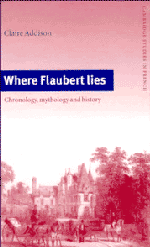Book contents
- Frontmatter
- Contents
- Publisher's note
- Acknowledgement
- Abbreviations and conventions
- Introduction
- 1 The Flaubert dates
- 2 The colours of time in the first Education sentimentale
- 3 Conception, birth, death in Madame Bovary
- 4 Heads and tails in Salammbô
- 5 Two-timing in L'Education sentimentale
- 6 The Hundred Days of Bouvard et Pécuchet
- 7 Petit dictionnaire de Flaubert
- Conclusion
- Diachronic and synchronic charts
- Bibliography
- Index
- Cambridge Studies in French
- Frontmatter
- Contents
- Publisher's note
- Acknowledgement
- Abbreviations and conventions
- Introduction
- 1 The Flaubert dates
- 2 The colours of time in the first Education sentimentale
- 3 Conception, birth, death in Madame Bovary
- 4 Heads and tails in Salammbô
- 5 Two-timing in L'Education sentimentale
- 6 The Hundred Days of Bouvard et Pécuchet
- 7 Petit dictionnaire de Flaubert
- Conclusion
- Diachronic and synchronic charts
- Bibliography
- Index
- Cambridge Studies in French
Summary
La bêtise consiste …
A 1965 article on Vigny's poetry in the Modern Language Review contains the following evaluation: ‘Vigny is blithely indifferent to historical accuracy. Wanda misdates a battle and the death of a Czar; providing the dates is bad enough, but they are wilfully wrong. Others cannot be reconciled with realism’ (Bowman, 359). In view of Vigny's precision about dates (Toesca, 69) and the fact that he seems to have carried the entire calendar of saints in his head (ibid., 40–1), and especially of his habit of furnishing his poems in later editions with earlier dates so as to try to deny Chénier's influence (Brandes, 81), one wonders how it is possible to make such naïve statements.
It is not enough that Vigny is accused of being slipshod: the question of the bienséances rears its antiquated head as well. Poetry and dates are incompatible; dates are in bad taste in a literary work: ‘providing the dates is bad enough, but they are wilfully wrong’. Is this not the precise attitude upon which the writer relies in order to encode his cryptic messages? Slipshod readings of literary works, here betokened by the ‘wilfully wrong’ comment, enable subliminal messages to be absorbed unawares by the reader. If Vigny takes the trouble to be ‘wilfully’ inaccurate, is it not worth the (professional) reader's while to consider the effect/cause of such inaccuracies?
It would seem obvious that the function of cryptic messages in a literary work is to beat the censorship in an oppressive regime, especially in view of the press laws governing Flaubert's career (J&T, 186–7).
- Type
- Chapter
- Information
- Where Flaubert LiesChronology, Mythology and History, pp. 282 - 283Publisher: Cambridge University PressPrint publication year: 1996

